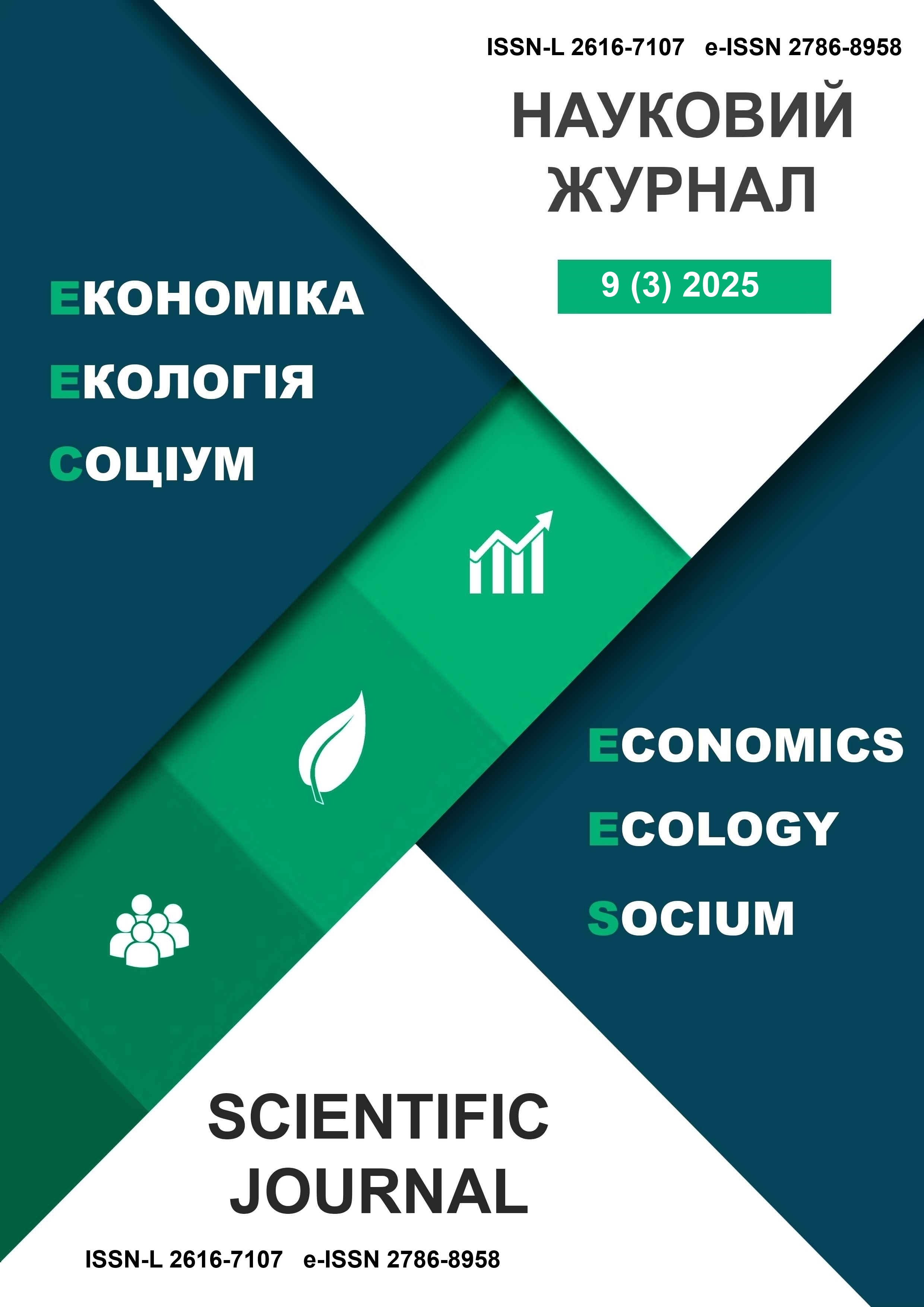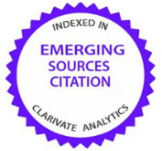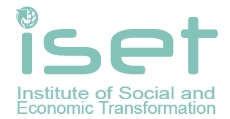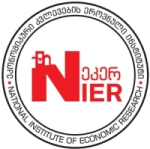Acquired Helplessness Syndrome in Monofunctional Systems Experiencing Multicrisis: Mechanisms Overcoming Challenges in Resilient Circular Economy
Abstract
Introduction. This study examines the issue of acquired helplessness syndrome (AHS) in monofunctional socio-ecological-economic systems, which are formed due to external armed aggression. The lack of integrated solutions covering demographic, social, economic, ecological, psychological, and institutional aspects limits the effectiveness of regeneration processes, reduces territorial competitiveness, and hinders development.
Aim and tasks. This study aims to develop an integrated conceptual and methodological model for overcoming AHS by combining circular economy tools, the resilience paradigm, and cognitive rehabilitation approaches.
Results. The analysis revealed interrelated demographic, economic, environmental, social, institutional, and psychological determinants of AHS that form sustainable barriers and risks to the restoration and modernisation of monofunctional systems (MFS). Using expert assessment and a matrix of relationships, the weighting coefficients of the influence of key determinant groups on socio-ecological-economic regeneration and rehabilitation were quantitatively assessed. Critical barriers, threats, and risks underlying the manifestations of SPB in MFS were identified. This approach made it possible to develop practical mechanisms for stabilisation and recovery, integrated into a holistic conceptual model, to form adaptive strategies for spatial development in a multi-crisis situation. A universal algorithm for restoring the stability of the MFS is proposed, ensuring competitiveness, adaptability, and inclusive territorial development, consistent with international post-crisis recovery practices.
Conclusions. The study confirmed that overcoming the AHS in monofunctional socio-ecological-economic systems requires integrating demographic, socio-ecological-economic, psychological, and institutional components into a single management system. The developed model and algorithm can serve as a universal methodological tool for the adaptation of various types of territorial entities in the future. The proposals contribute to restoring the cognitive and social activities of local communities and increasing their resilience to multidimensional threats. Prospects for further research are related to testing model solutions in various regional contexts, assessing their effectiveness, and developing digital tools to support management decisions in the regenerative development and rehabilitation of MFS.
Keywords:
AHS, Monofunctional Systems, Circular Economy, Resilience, Sustainability.References
Biggs, R., Schlüter, M., & Schoon, M. L. (2015). Principles for building resilience: Sustaining ecosystem services in social-ecological systems. Cambridge University Press. https://doi.org/10.1017/CBO9781316014240
Bonanno, G. A. (2021). The resilience paradox. European Journal of Psychotraumatology, 12(1), 1942642. https://doi.org/10.1080/20008198.2021.1942642
Calzolari, T., Genovese, A., & Brint, A. (2021). The adoption of circular economy practices in supply chains: An assessment of European multi-national enterprises. Journal of Cleaner Production, 312, 127616. https://doi.org/10.1016/j.jclepro.2021.127616
Camagni, R., & Capello, R. (2013). Regional competitiveness and territorial capital: A conceptual approach and empirical evidence from the European Union. Regional Studies, 47(9), 1383–1402. https://doi.org/10.1080/00343404.2012.681640
Circle Economy Foundation. (2024). The circularity gap report 2024. Circle Economy. https://www.circularity-gap.world/2024
Geissdoerfer, M., Savaget, P., Bocken, N. M. P., & Hultink, E. J. (2017). The Circular Economy – A new sustainability paradigm? Journal of Cleaner Production, 143, 757–768. https://doi.org/10.1016/j.jclepro.2016.12.048
Kennedy, S., & Linnenluecke, M. K. (2022). Circular economy and resilience: A research agenda. Business Strategy and the Environment, 31(6), 2754–2765. https://doi.org/10.1002/bse.3004
Kirchherr, J., Piscicelli, L., Bour, R., Kostense-Smit, E., Muller, J., Huibrechtse-Truijens, A., & Hekkert, M. (2018). Barriers to the circular economy: Evidence from the European Union (EU). Ecological Economics, 150, 264–272. https://doi.org/10.1016/j.ecolecon.2018.04.028
Korhonen, J., Nuur, C., Feldmann, A., & Birkie, S. E. (2018). Circular economy as an essentially contested concept. Journal of Cleaner Production, 175, 544–552. https://doi.org/10.1016/j.jclepro.2017.12.111
Libanova, E. (2024). Resilience of Ukraine’s socio-economic system to shocks caused by war: Features of formation and response. Demography and Social Economy, 58(4), 3–23. https://doi.org/10.15407/dse2024.04.003
Longman, J., Braddon, M., Verlie, B., Schlosberg, D., Hampshire, L., Hawke, C., Noonan, A., & Saurman, E. (2023). Building resilience to the mental health impacts of climate change in rural Australia. The Journal of Climate Change and Health, 12, 100240. https://doi.org/10.1016/j.joclim.2023.100240
Maier, S. F., & Seligman, M. E. P. (2016). Learned helplessness at fifty: Insights from neuroscience. Psychological Review, 123(4), 349–367. https://doi.org/10.1037/rev0000033
Melnyk, M. I. (Ed.). (2024). Resilience of endogenous regional development under global challenges and shocks: Collective monograph. Institute of Regional Research named after M. I. Dolishniy of the NAS of Ukraine.
Mykytenko, V. (2024). Forecasted format of the hybrid scenario of spatial recovery: Information-technological architecture and socio-ecological-economic determinants. Bulletin of Economic Science of Ukraine, 2(47), 12–21. https://doi.org/10.37405/1729-7206.2024.2(47).12-21
Mykytenko, V., & Sheludko, N. (2025). Rehabilitation of mono-functional territories based on the model of cognitive-spatial recovery. Ukrainian Society, 2(93), 158–193. https://doi.org/10.15407/socium2025.02.158
OECD. (2021). OECD economic outlook (Vol. 2021/1). OECD Publishing. https://doi.org/10.1787/edfbca02-en
Organisation for Economic Co-operation and Development. (2022). Resilience systems analysis: Guidelines and case studies. OECD Publishing. https://www.oecd.org/risk/resilience-systems-analysis.htm
Organisation for Economic Co-operation and Development. (2023). How resilient are OECD societies? Insights from the OECD well-being framework. OECD Publishing. https://doi.org/10.1787/9789264788453-en
Parnell, J. A., & Crandall, W. ‘Rick.’ (2020). The contribution of behavioral economics to crisis management decision-making. Journal of Management & Organization, 26(4), 585–600. https://doi.org/10.1017/jmo.2017.60
Pike, S. (2017). Destination positioning and temporality: Tracking relative strengths and weaknesses over time. Journal of Hospitality and Tourism Management, 31, 126–133. https://doi.org/10.1016/j.jhtm.2016.11.005
Putnam, R. D. (2000). Bowling alone: The collapse and revival of American community. Simon & Schuster.
Saaty, T. L. (1990). The Analytic Hierarchy Process: Planning, Priority Setting, Resource Allocation. Pittsburgh: RWS Publications.
Seligman, M. E. P. (1975). Helplessness: On depression, development, and death. W. H. Freeman.
Sen, A. (2014). Development as freedom. In T. Roberts, A. Hite, & N. Chorev (Eds.), The globalization and development reader: Perspectives on development and global change (2nd ed., pp. 525–534). Wiley-Blackwell. (Original work published, 1999)
Sharifi, A. (2023). Resilience of urban social-ecological-technological systems (SETS): A review. Sustainable Cities and Society, 99, 104910. https://doi.org/10.1016/j.scs.2023.104910
State Statistics Service of Ukraine. (2023). Statistical yearbook: Environment of Ukraine. Derzhstat Ukrainy. https://ukrstat.gov.ua
Ungar, M. (2021). Modeling multisystemic resilience: Connecting biological, psychological, social, and ecological adaptation in contexts of adversity. In Multisystemic Resilience (pp. 6–32). Oxford University PressNew York.
United Nations Environment Programme. (2023). Global environment outlook 7: Healthy planet, healthy people. UNEP. https://www.unep.org/resources/global-environment-outlook-7
Wang, Y., Zhou, C., Qian, X., Zhao, Y., Gao, L., & Xu, W. (2025). Learned helplessness among vocational nursing students: Current status and influencing factors. BMC Medical Education, 25, Article 881. https://doi.org/10.1186/s12909-025-07571-3
World Bank. (2024). World development indicators. The World Bank Group. https://data.worldbank.org
If the article is accepted for publication in the journal «Economics. Ecology. Socium» the author must sign an agreementon transfer of copyright. The agreement is sent to the postal (original) or e-mail address (scanned copy) of the journal editions.






















